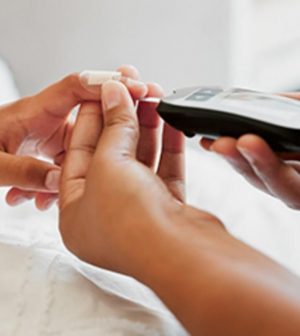- Could Your Grocery Store Meat Be Causing Recurring UTIs?
- Are You Making This Expensive Thermostat Error This Winter?
- Recognizing the Signs of Hypothyroidism
- 10 Strategies to Overcome Insomnia
- Could Artificial Sweeteners Be Aging the Brain Faster?
- Techniques for Soothing Your Nervous System
- Does the Water in Your House Smell Funny? Here’s Why
- Can a Daily Dose of Apple Cider Vinegar Actually Aid Weight Loss?
- 6 Health Beverages That Can Actually Spike Your Blood Sugar
- Treatment Options for Social Anxiety Disorder
Years of Diabetes Could Speed Onset of Menopause

The earlier a woman is diagnosed with diabetes, the sooner she may enter menopause, new research shows.
Rates of diabetes have grown steadily, so researchers wanted to understand the long-term implications of premenopausal diabetes on women’s reproductive health.
Their study of more than 11,000 women found that being diagnosed with type 1 diabetes before age 30 or type 2 diabetes between 30 and 39 were both linked to earlier onset of menopause.
A diagnosis of type 2 diabetes after age 40, however, was associated with later menopause, compared to women without diabetes.
The researchers found no significant association between diabetes during pregnancy (gestational diabetes) and age at menopause.
“Even after adjusting for covariates associated with age at natural menopause, we still find an association between early diagnosis of diabetes and earlier menopause and a later diabetes diagnosis with a later age at menopause as compared to those who did not have diabetes,” said lead study author Vrati Mehra, of the University of Toronto.
“We hope our work lays the foundation for more research in this area so we can better understand and prevent the long-term impacts of diabetes on the human body and the reproductive system,” she added.
The findings are scheduled to be presented in Atlanta Thursday at a meeting of the North American Menopause Society (NAMS). Findings presented at medical meetings should be considered preliminary until published in a peer-reviewed journal.
NAMS medical director Dr. Stephanie Faubion said the research adds to growing evidence about the collective toll diabetes takes on the human body.
“In this case, it shows that young women living with a diagnosis of diabetes are more susceptible to accelerated ovarian aging and early menopause,” Faubion said in a society news release.
More information
The U.S. Centers for Disease Control and Prevention has more on diabetes.
SOURCE: North American Menopause Society, news release, Oct. 12, 2022
Source: HealthDay
Copyright © 2026 HealthDay. All rights reserved.










